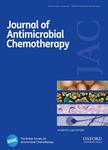版权所有:内蒙古大学图书馆 技术提供:维普资讯• 智图
内蒙古自治区呼和浩特市赛罕区大学西街235号 邮编: 010021

作者机构:Hop Bichat Claude Bernard Parasitol Lab APHP Ctr Natl Reference Chimiosensibil Paludisme F-75877 Paris 18 France Univ Paris 05 EA 209 Lab Biol Anim & Parasitaire Paris France Inst Med Trop Serv Sante Armees Unite Rech Biol & Epidemiol Parasitaires Marseille France Inst Federat Rech 48 Marseille France Inst Trop Med Serv Sante Armees Unite Rech Pharmacogenet Parasitaire Marseille France
出 版 物:《JOURNAL OF ANTIMICROBIAL CHEMOTHERAPY》 (抗菌化学疗法杂志)
年 卷 期:2006年第57卷第1期
页 面:110-115页
核心收录:
学科分类:0710[理学-生物学] 1007[医学-药学(可授医学、理学学位)] 1006[医学-中西医结合] 1004[医学-公共卫生与预防医学(可授医学、理学学位)] 1002[医学-临床医学] 10[医学] 100602[医学-中西医结合临床]
基 金:DRT/STRDT French Armed Forces Health Service French Research Ministry Ministère des Affaires Sociales et de la Santé Délégation Générale pour l'Armement, DGA
主 题:susceptibility malaria antimalarials P. falciparum
摘 要:Objectives: We examined the atovaquone in vitro susceptibility and the cytochrome b (cytb) gene polymorphism of African Plasmodium falciparum isolates during the first years of atovaquone/proguanil use. Patients and methods: Between 1999 and 2004, we collected blood samples from French P. falciparum-infected patients returning from African countries. Atovaquone susceptibility was determined using an in vitro isotopic test and cytb genotyping was performed by restriction fragment length polymorphism analysis and sequencing. These results were analysed according to the clinical response to atovaquone/proguanil treatment. Results: No in vitro atovaquone resistance (IC50 1900 nM) and no cytb mutation leading to the Y268S substitution were detected among 477 unexposed African P. falciparum isolates. Eight cytb polymorphisms were found outside the ubiquinone reduction site by sequencing the entire gene of 270 isolates. One atovaquone/proguanil treatment failure was documented;the post-treatment isolate had an atovaquone susceptibility of 8230 nM and the Ser(268) Cytb change;the pre-treatment isolate, obtained 4 weeks previously, was Cytb Tyr(268) (wild-type). Conclusions: No atovaquone/proguanil resistance was detected by phenotyping or genotyping among 477 unexposed African P. falciparum isolates. Atovaquone/proguanil-resistant parasite was detectable only in the post-treatment isolate from a treatment failure.